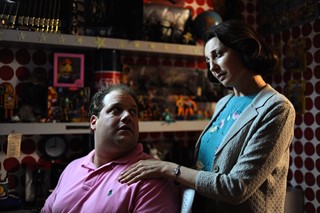“Solondzian” has become a byword for the kind of pitch-black comic irony US indie director Todd Solondz does best...
“Solondzian” has become a byword for the kind of pitch-black comic irony US indie director Todd Solondz does best, in which wallflowers are mercilessly humiliated and suburbia’s underbelly teems with sexual depravity and emotional cruelty. His latest film Dark Horse sees 30-something action-figure collector Abe (Jordan Gelber), who still lives at home in his junior-high bedroom, become engaged to a morbidly depressed failed writer (Selma Blair) he meets at a wedding. You’d expect Solondz’s addition to the current spate of man-child films about guys unwilling to take on adult responsibilities to be much more cynical than anything by Judd Apatow or the Duplass brothers – and it is, but with new notes of sweetness absent from his earlier controversies like Happiness. We met with the director at the Karlovy Vary International Film Festival last week to find out if this master of cinematic misanthrophy could be embracing hopeful glimmers.
Dark Horse is lighter and warmer than your former films – are you mellowing?
The American poster had blurbs from two critics – one said it was brilliantly cruel and acid, and the other that it was so tender, so gentle. Who’s right? It’s a question of sensibility. I know my movies are fraught with a certain ambiguity, but there’s always an ambivalent response. Have I changed? I leave that up to others to determine. I feel very moved by the plight of this character. It’s something of a challenge I set to the audience here. Here’s a character that’s very abrasive and off-putting, someone you don’t want to have lunch with; you may want to dismiss him out of hand. And yet I say there is something of value to him; a vulnerability, an inner life that is worth caring about. Especially as he is not categorised as a hero – even more reason to care.
You’re often termed misanthropic – is that accurate, or do you feel misunderstood?
I don’t know, sometimes it’s a blessing to be misunderstood. Everything is smoke and mirrors, and sleight of hand. People often try to attach biographical elements in terms of what they imagine with my personal life. Of course everything is autobiographical even though none of it actually happened, so it’s a sensibility that is reflected. There’s always a distinction between me being cruel to a character and me examining cruelty. Life is so much crueler than anything I can put in my movies. I always find myself having to soften things to make it accessible to an audience, because you just read the newspaper every day and it’s always terribly depressing.
"The comedy and pathos in my films are combined, one feeds into the other and that’s what gives it the charge."
You show everyday, ordinary cruelty…
It has to start somewhere.
Do you think optimism is naive?
Optimism in and of itself is devoid of meaning without context. It’s like asking would it be good for Jews to be optimistic when they go to the gas chamber. It’s all about context. Life is not fair – it’s a lesson you learn early on in life and you spend your whole life trying to accept that. Bad things happen to good people, and people that do terrible things, like Hitler or Stalin; they still die thinking they were fighting the good fight. So there is a kind of cruelty inherent in life that it’s hard not to acknowledge, but that does not mean it’s without the possibility of a kind of grace.
Your films explore this pressure in the US that you have to be outwardly successful or you’re deemed a loser.
It’s another form of fascism, yes.
Is that a specifically American form of affliction, would you say?
Certainly if you’re talking about secular, prosperous, consumerist democracies this phenomenon of this kind of character is somewhat of a staple. There are many people, particularly men, who are afflicted with this condition.
Would you ever make a film that had no element of humour in it?
Oh god, oh no, it would be unbearable to sit through these stories if they weren’t comedies. The comedy and pathos are combined, one feeds into the other and that’s what gives it the charge.
What do you hope your audience will take from your films?
I hope for an hour and a half or two hours an audience experiences a revitalising sort of affect. Because I don’t think movies will in any kind of obvious way change the world, or that watching them makes people a better person. If that were true then it should be a law that people go to the movies – there’s no correlation.
Are you contented in your own life now?
The further I get away from my youth, the happier I am. I teach at a film school and my students are in their twenties and thirties. They’re all very hopeful and young and ambitious, and it just makes me so happy not to be in their shoes. The idea of having to go through that, oh, I just couldn’t. I feel very lucky to have been able to make these movies, it’s such an anomaly; it is very much a dark horse career. If I’m not happy now I’m certainly not miserable. I was very unhappy when I was younger. And really just surviving this far is a huge accomplishment. You know, 100 years ago the average mortality for a man in the Unites States was 47, so now this is all golden.
Dark Horse is now showing in UK cinemas.
Text by Carmen Gray
